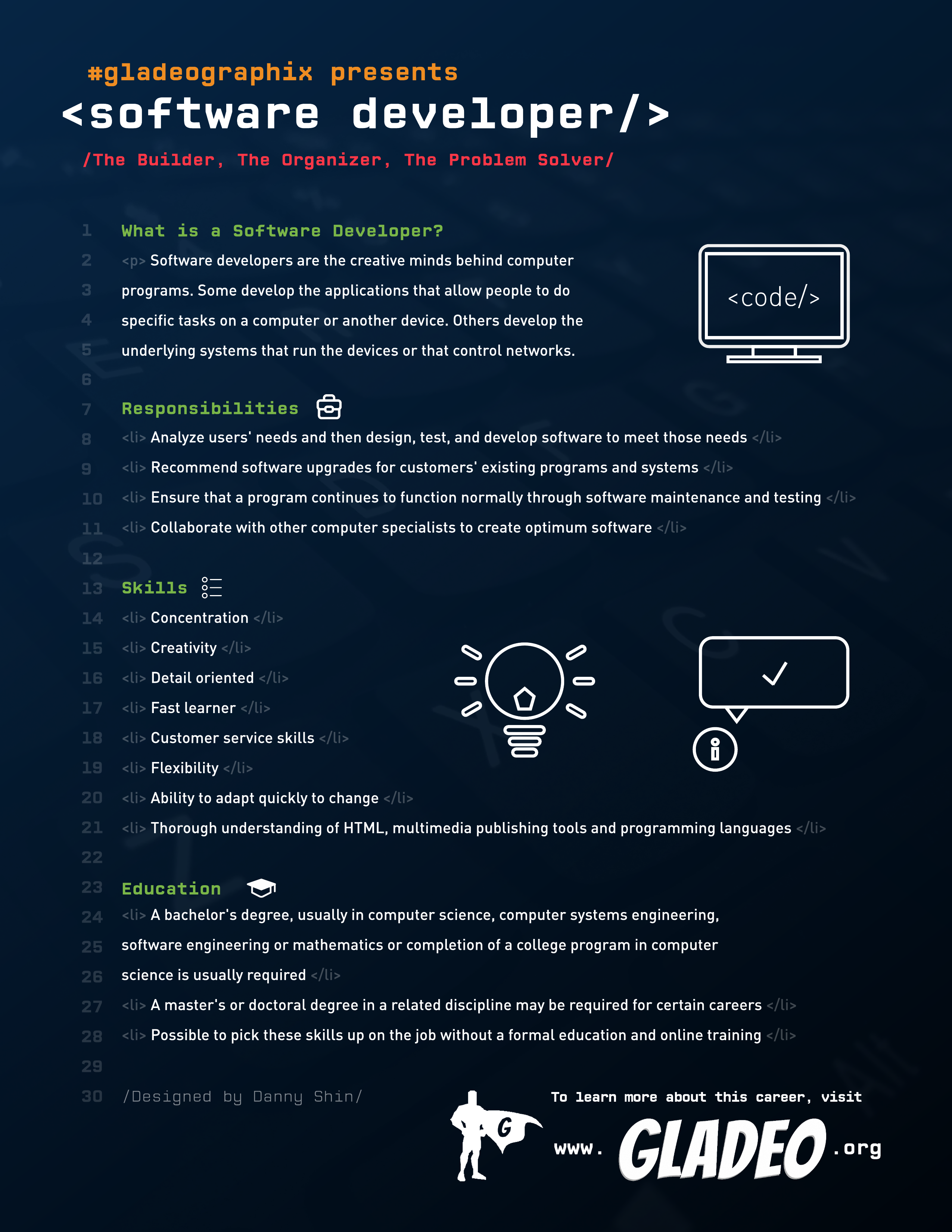Focos
Software Engineer, Application Developer, Software Architect, Computer Programmer, Game Programmer, Game Software Developer, Applications Software Developer/Programmer
Software developers are the creative minds behind computer programs. Some develop the applications that allow people to do specific tasks on a computer or another device. Others develop the underlying systems that run the devices or that control networks.
- Ability to grow within company of choice
- Ability to take charge of projects and influence others
- Expand on tech knowledge every day
- Ability to directly affect a company’s growth
- Analyze users’ needs and then design, test, and develop software to meet those needs
- Recommend software upgrades for customers’ existing programs and systems
- Design each piece of an application or system and plan how the pieces will work together
- Create a variety of models and diagrams (such as flowcharts) that show programmers the software code needed for an application
- Ensure that a program continues to function normally through software maintenance and testing
- Document every aspect of an application or system as a reference for future maintenance and upgrades
- Collaborate with other computer specialists to create optimum software
Different types of developers
- Back-end developers - responsible for the overall technical construction of the website
- Front-end developers - responsible for how a website looks (layout and graphics)
- Webmasters - maintain websites and keep them updated
- Concentration
- Creatividad
- Customer service skills
- Orientación al detalle
- Thorough understanding of HTML, multimedia publishing tools and programming languages
- Flexibilidad
- Fast learner
- Ability to adapt quickly to change
- Expectations: ability to learn on the fly and deliver quality and maintainable code
- Sacrifices: having to fill in the holes and help other team members, on top of own responsibilities, especially when working with unclear requirements from product companies
- Tech company (doesn’t matter if it’s a large company or a startup): i.e. Google, Facebook
- Organizations that deal with operations that can be done programmatically (more and more organizations are fitting this description)
- Option of creating own startup
- Can freelance develop for multiple companies
- Development Shop
- Artificial Intelligence that make software/application/system smarter day by day
- Integrated machine learning to help machines think like humans
- Examples of this software: Google Assistant, Siri, Alexa
- Big Data
- Open source software development: Open source's original source code is made readily available and may be redistributed and modified, making it the key to innovation in a variety of spheres. Releasing open source not only nurtures individual businesses but evolves, creates, and sometimes lays waste to entire industries. Using open source, making your projects open source, and being an active part of the open source community is a necessary way to keep up with technology and be a part of a larger community. [www.oreilly.com]
- Infrastructure disruption and re-assembly: These new programs allow software engineers to focus on growing the business instead of worrying about whether or not the "internal organs" are functioning properly: XaaS, serverless architecture, distributed systems, containers, and microservices. Utilize third-party services like OpenStack for its computing power, building reactive microservices to compartmentalize and focus segments of your architecture to create a much more resilient and scalable environment, and deploy software continuously with cloud-native tools like Docker and Kubernetes. [www.oreilly.com]
- Machine learning: OpenAI (Elon Musk), Watson (IBM), TensorFlow (Google), and CNTK (Microsoft) have created new exciting products (Alexa) and paradigms (voice-driven apps), and infrastructure automation, causing Machine learning to officially heat up again and for good this time around. [www.oreilly.com]
- Customer-first design: "Putting the customer first leads to success every time" [www.oreilly.com]
- Enjoy playing games / problem solving
- Interested in science
- Passion for programming
- Desire to discover new ideas and acquire as much knowledge as possible
- Frequented libraries
- Enjoyed talking with friends for hours about ideas, discoveries, books
- Interest in developing skills, brainstorming, reading, and environmental awareness
“I was fairly into games, and I am sure that was a factor as well at the end, but I actually was more into science when I was younger. I attended college for chemical engineering before I switched over. The spark and passion for programming probably came from my high school programming course where I thoroughly enjoyed the problems that were presented, as well as breaking them down in a logical manner, such as the complexities of creating a simulated fish tank.” Leon Ho, Software Engineer at OpenX
- Software Engineers can get started with a bachelor’s in computer science or related field of study
- Advanced positions may require a master’s
- Software Engineer internships are very useful for learning while gaining practical experience
- There are numerous Software Engineer-related certificates available, including:
- Springboard Software Engineering Bootcamp
- Certified Secure Software Lifecycle Professional
- Professional Software Developer Certification
- CIW Web Development Professional
- Oracle Certified Master
- Microsoft Certified Azure Solutions Architect
- O*Net lists a wide array of technology skills needed, including several software types such as access, analytical, application server, backup, business intel, cloud-based data access, communications server, configuration management, content workflow, database management, data mining, development environment, enterprise resource planning, and many more
- Solve puzzles, play chess and other strategy games and read
- Analyze how things work in everyday life; example: gravity
- Start exploring how to approach problems and solve them logically, along with data structures and algorithms
- Side code projects are always a plus as well
- Common class topics include advanced math, AP Calculus, AP Statistics, AP Physics, engineering, physics, and plenty of computer science courses such as fundamentals of programming, data structures, intro to algorithms, operating systems, computer architecture, Human - Computer Interaction, and discrete mathematics
- Study frameworks like React, Angular, Express, and Rails
- Popular programming languages for Software Engineers are Java, Python, JavaScript, C++, and Scala
- Decide if you want to stop at a bachelor’s then apply for jobs, or press on with a master’s first
- Work on the relevant certifications you want to complete prior to job searching
- Build a portfolio website to showcase your work with case studies
- Join school computer clubs where you can trade information and stay motivated
- Learn on your own time from videos, books, and side projects
- Apply to Software Engineer intern jobs to gain real-world experience
- Work on your draft resume as you knock out academic and work milestones
- Ask teachers for recommendations
- Take advantage of freelance opportunities
- Apply to job openings at tech companies
- Experiment with different industries
- Start own startup with clear vision and business plan (can use Kickstarter for funding)
- Use social media to make industry connections
- Build profiles on job portals such as Monster, Indeed, Glassdoor, Zippia, as well as IT-related sites like Machine Hack, MLconf Job Board, Stack Overflow, AngelList, and DataJobs. Don’t forget to use LinkedIn, too!
- Apply for junior positions until you get enough experience to qualify for advanced roles
- Take notice of the keywords used in job ads. Incorporate those into your resume
- Check out Software Engineer resume templates for ideas on phrasing
- Ask potential references in advance before giving out their contact information
- Prepare for interviews by reading Software Engineer interview questions
- Be yourself during interviews and let your personality shine! Technical competence is important, but so is culture fit. You want to ensure that you and the company you’re applying to are a good match for one another
- Read about new technology
- Doesn't have to be limited to your job, could be anything that sharpens your problem solving skills
- Ability to adapt is really important
- Bright minds who can pivot quickly
Requirements:
- Training in vocational schools, related on-the-job experience, or an associate's degree
- Previous work-related skill, knowledge, or experience ne or two years of training involving both on-the-job experience and informal training with experienced workers, i.e. a recognized apprenticeship program
- Strong communication and organizational skills to coordinate, supervise, manage, or train others to accomplish goals, i.e.hydroelectric production managers, travel guides, electricians, agricultural technicians, barbers, nannies, and medical assistants
- Information security analysts
- Founder of tech company
- Patent Agent
- Abogado de patentes
Noticias

Ofertas de empleo

Cursos y herramientas en línea









